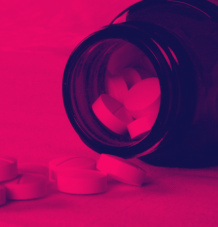Dodgy feelings haunt antidepressants
 Nearly 30 years after the introduction of Prozac, people diagnosed with depression are still questioning the legitimacy of antidepressants.
Nearly 30 years after the introduction of Prozac, people diagnosed with depression are still questioning the legitimacy of antidepressants.
A far-reaching international survey has found that peoples' worries about antidepressants are very much like their worries about illicit substances.
For example, antidepressant users often feel the need to keep their use secret. They also fear addiction, “going cold turkey”, worry about the potential for personality changes and about the mind altering strength of the medication.
Such concerns mean that some people experiencing severe depression reject or stop a treatment that might be useful to them.
Some people in the research argued antidepressants made them feel ‘more authentic’, others were particularly afraid that antidepressants might change their personality.
One person involved in the study said; “[I was a] functional zombie…[it] takes away the bad, but also takes away the good.”
Interestingly, the research found that many people diagnosed with depression talked as if their antidepressant use was “pseudo-illicit”.
A one man in the UK said of his medication, “it feels very sordid...my dirty little habit, a dirty little stash.”
While doctors will usually tell their patients that it can take many weeks for antidepressants to work, some of the participants in the research believed they were feeling the effects – and even high – after only a few hours or days.
One woman from Australia said, “… it was amazing…within two hours I could feel different,” while a man from the UK said, “It was like being on really strong drugs… made your pupils dilate.”
The problems of this ‘pseudo-illicitness’ were clear to those considering or taking antidepressants: Things can go wrong.
One UK respondent said, “I found it quite scary… I wasn’t really ready for taking drugs of that strength,” while others reported they later crashed, or had frightening hallucinations on their antidepressant.
Being on antidepressants is frequently considered some kind of moral failing, and a barely legitimate practice in many quarters.
“Given our findings, it is no wonder people in distress find it so difficult to decode the social messages they receive about antidepressants,” says Professor Damien Ridge from University of Westminster.
“Of particular concern, those experiencing severe depression who are the most likely to benefit from taking antidepressant medication may think twice about using a potentially life-saving treatment.
“People experiencing depression – no matter how positive about antidepressants – are still forced to engage at some level with a range of underlying moral concerns about antidepressants.
“But a number of people we talked to were defiant about the bad publicity. One person said that their antidepressant was really just ‘a bit like Berocca, it’s you on a good day’, while another said; ‘I challenge anyone to live my life… without antidepressants!’”







 Print
Print